Adjective topics:
What is an adjective?
Adjectives are descriptive words that modify nouns or pronouns – they describe people, places, or things. Here are some examples of common adjectives in the English language:
- Describing color: red, yellow, green, white, black
- Describing size: big, small, huge, tiny
- Describing shape: round, flat, square, triangular
- Describing age: old, young, ancient, new
- Describing nationality/origin: Brazilian, Spanish, Korean, Polish, Chinese
Click here for 200+ countries and nationalities - Describing material: silver, leather, stone, cotton, plastic
(these are nouns as well, but they can also be adjectives: a silver necklace, a cotton T-shirt) - Describing other qualities: good, bad, delicious, important, funny, painful, interesting, tired, comfortable, dangerous, fast, healthy

Learn adjectives: fresh, healthy, delicious food
How to use adjectives in a sentence
We can use an adjective before the noun it describes, for example:
- I used to have a red car.
- My parents live in a huge house.
- She has a round face.
- We bought two new bicycles.
- Let’s get some Chinese food.
- That silver necklace is expensive.
- I like interesting books.
We can also use them in this sentence structure:
noun/pronoun + a form of the verb “to be” + adjective
- My previous car was red.
- Their house is huge.
- Her face is round.
- Our bicycles are new.
- This food is Chinese.
- I like that necklace. It’s silver.
- Those books were interesting.

Two structures with adjectives: I like interesting books. The books were interesting.
Adjective lists & examples
You probably already know the 10 most common adjectives, because they are used very frequently by native English speakers:
- Good: She is a good singer with a beautiful voice.
- New: I bought a new car yesterday and I’m excited to drive it.
- First: This is my first time visiting this city.
- Last: The last train leaves at midnight, so don’t miss it.
- Long: We had a long conversation about our future plans.
- Great: It was a great movie, and I highly recommend watching it.
- Little: The little puppy followed me around the house everywhere I went.
- Own: She has her own business and enjoys being her own boss.
- Other: I prefer the other option because it offers more benefits.
- Old: The old house has a lot of history and charm.
There are many more to learn in the English language! Here are some good adjective lists to get you started:
Basic lists of adjectives:
More advanced lists of adjectives:
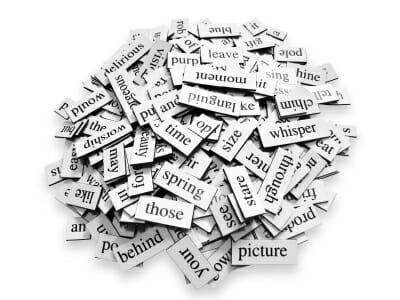
Study adjective lists to help you learn descriptive words
Comparative Adjectives
We use comparative adjectives to compare two things – for example, better, faster, more expensive. Let’s look at how to form them in English.
With One-Syllable Words: Add -ER
| Tall | Taller |
| Old | Older |
| Fast | Faster |
| Long | Longer |
| New | Newer |
- My new car is faster than my old car.
- I’m older than my brother.
- Traveling by bike takes longer than traveling by motorcycle
With words that end in consonant + vowel:
Double the last letter and add -ER
| Big | Bigger |
| Hot | Hotter |
| Thin | Thinner |
- An elephant is bigger than a cat.
- Brazil is hotter than Sweden.
- My sister is thinner than me.
With words that end in consonant + y:
Remove -y and add -IER
| Easy | Easier |
| Happy | Happier |
| Busy | Busier |
- Reading English is easier than listening.
- Maria is happier than Dave.
- People today are busier than in the past.
Words with 2+ syllables: Add “more”
| Expensive | More expensive |
| Popular | More popular |
| Interesting | More interesting |
- A car is more expensive than a computer.
- Michael Jackson’s music is more popular than country music.
- Watching a movie is more interesting than studying grammar.
Irregular Comparative Adjectives
| Good | Better |
| Bad | Worse |
| Far | Farther |
- Eating fruit is better for your health than eating hamburgers.
- Cancer is worse than the flu.
- One mile is farther than one kilometer.
Don’t forget than!
- An elephant is bigger a cat.
- An elephant is bigger than a cat.
More examples of comparative adjectives
Comparative Adjectives Quiz
Negative comparatives: “Less than” or “Not as ____ as”
- Movies are less interesting than books.
- Movies are not as interesting as books.
- Beer is less expensive than wine.
- Beer is not as expensive as wine.
- Running is not as fast as biking.
- Canada is not as hot as Ecuador.
- Helen is not as friendly as her husband.
- Playing video games is not as good as exercising.
We can use “less” or “not as… as” with the 2+ syllable adjectives – less difficult, less exciting, less involved.
With one-syllable adjectives, we can only use “not as… as” or simply the opposite adjective.
- Canada is less hot than Ecuador.
- Canada is not as hot as Ecuador.
- Canada is colder than Ecuador.
- Ecuador is hotter than Canada.
Remember that in this structure, we don’t use -ER or “more” with the adjective.
This shirt isn’t as prettier as that blouse.
This shirt isn’t as pretty as that blouse.Last week’s test wasn’t as worse as the previous one.
Last week’s test wasn’t as bad as the previous one.
Comparative Adjectives Exercise: NOT AS _____ AS
Congratulations - you have completed Comparative Adjectives Exercise: NOT AS _____ AS.
You scored %%SCORE%% out of %%TOTAL%%.
Your performance has been rated as %%RATING%%
Superlative Adjectives
Use superlatives to compare 3 or more things. Here’s how to form them:
- Add -EST to one-syllable words: the tallest, greatest, cleanest
- Remove -Y and add -IEST: the friendliest, trendiest, craziest
- Add “the most” to 2+ syllable words not ending in Y: the most expensive, the most amazing, the most difficult
- Some superlatives are irregular: the best, the worst, the farthest, the most fun
Adjective |
Comparative |
Superlative |
| Old | Older | The oldest |
| Big | Bigger | The biggest |
| Easy | Easier | The easiest |
| Beautiful | More beautiful | The most beautiful |
| Good | Better | The best |
| Bad | Worse | The worst |
| Far | Farther | The farthest |
Examples:
- My grandmother is the oldest person in my family.
- Russia is the biggest country in the world.
- This is the easiest test I’ve ever taken.
- Donna is the most beautiful woman I’ve ever seen.
- I like all sports, but I like soccer the best.
- Picking up garbage was the worst job I’ve ever had.
- Australia is the farthest I’ve ever traveled.
Don’t forget the definite article “the”!
My grandmother is oldest person in my family.- My grandmother is the oldest person in my family.
Superlative adjectives are often used with the present perfect + ever:
- This is the best sushi I’ve ever eaten.
- What’s the most expensive car you’ve ever driven?
- The longest book I’ve ever read was 500 pages.
- Jan is the friendliest person I’ve ever met.
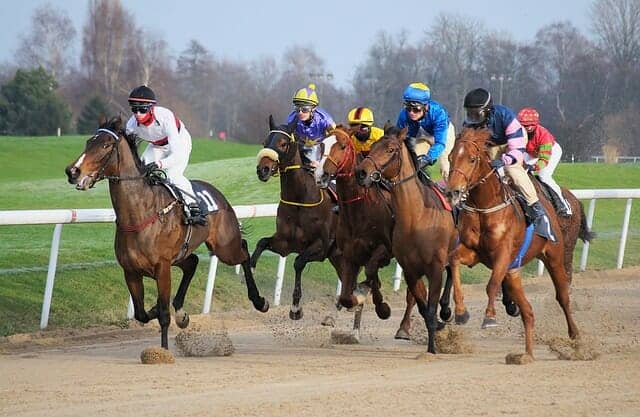
Superlatives: The FASTEST horse won the race.
Try these quizzes to review superlative adjectives, and then choose between the comparative and superlative:
Superlatives Quiz
Quiz: Comparative or Superlative?
Regular & extreme adjectives
Regular adjectives in English are “gradable” – that means you can have different degrees or levels of that quality. For example, a movie can be slightly scary, rather scary, very scary, or extremely scary.
Extreme adjectives or non-gradable adjectives are descriptive words that mean “extremely + adjective” – for example, “terrifying” means “extremely scary.” A movie can’t be “a little bit terrifying” or “very terrifying” – because the word “terrifying” itself automatically means “extremely scary.”
- Regular Adjective: Beautiful
- Extreme Adjective: Stunning
- Regular Adjective: Cold
- Extreme Adjective: Freezing
- Regular Adjective: Hot
- Extreme Adjective: Scorching
- Regular Adjective: Tired
- Extreme Adjective: Exhausted
- Regular Adjective: Happy
- Extreme Adjective: Ecstatic
- Regular Adjective: Sad
- Extreme Adjective: Devastated
- Regular Adjective: Big
- Extreme Adjective: Enormous
- Regular Adjective: Small
- Extreme Adjective: Tiny
- Regular Adjective: Good
- Extreme Adjective: Excellent
- Regular Adjective: Bad
- Extreme Adjective: Terrible

Regular adjective: COLD. Extreme adjective: FREEZING.
There are some special grammar rules about extreme adjectives:
- No comparatives/superlatives. We can say “good / better / the best” (regular adjective) but we typically don’t say “more excellent” or “the most excellent.” (extreme adjective)
- No adverbs of degree (a little / slightly / very). We can say “slightly happy” and “very happy” (regular adjective) but we don’t say “slightly ecstatic” or “very ecstatic” (extreme adjective)
- We can use the adverbs “absolutely” and “completely” for extra emphasis of extreme adjectives; we can’t use these with regular adjectives. We can say “absolutely starving” and “completely devastated” (extreme adjectives) but not “absolutely hungry” and “completely sad” (regular adjectives
Another type of extreme adjective is called an “absolute” adjective. These are words that are either “yes or no.” For example, impossible – something can’t be “a little impossible” or “very impossible” – either YES, it’s impossible, or NO, it’s not impossible.
See more examples of extreme and absolute adjectives – plus a quiz!
Compound adjectives
Compound adjectives are adjectives that have two words. Here are some compound adjective examples with sentences.
- Long-term: They are in a long-term relationship and have been together for over a decade.
- Well-known: He is a well-known actor who has starred in several blockbuster movies.
- Open-minded: She is open-minded and willing to consider different perspectives.
- Narrow-minded: He has a narrow-minded view of the world and is resistant to new ideas.
- Hardworking: She is a hardworking employee who always goes the extra mile.
- Good-natured: He is a good-natured person who is always willing to lend a helping hand.
- Fast-paced: The city has a fast-paced lifestyle, with people always rushing around.
- Light-hearted: The comedy show provided a light-hearted escape from the stresses of daily life.
- Easygoing: He has an easygoing personality and doesn’t get easily stressed or bothered.
- Thought-provoking: It was a thought-provoking novel.
You can see lots more compound adjectives here.
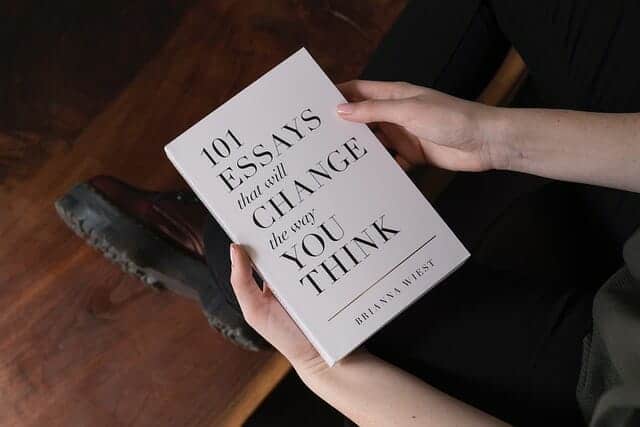
Compound adjective: It was a THOUGHT-PROVOKING book.
Adjectives + prepositions
Many adjectives have specific prepositions that are used after them. These may be different than the combinations that are used in your native language. For example:
- I’m interested in learning English.
(not “interested of” or “interested about”) - He’s married to a woman he met in college.
(not “married with”) - This product is different from that one.
(not “different for” or “different of”)
Some adjectives can be followed by different prepositions. Sometimes these mean essentially the same thing, and other times the meaning and use is different:
- I’m excited about my vacation. = I’m excited for my vacation.
No difference in meaning - I was surprised by his reaction. = I was surprised at his reaction.
No difference in meaning - He’s good at swimming.
“Good at” is used for people’s abilities - This knife is good for cutting vegetables.
“Good for” is used for objects’ function or benefit - She’s afraid of spiders.
“Afraid of” is used for things that cause fear in general - She’s afraid to tell the truth.
“Afraid to” is used for actions we are considering doing, but fear is making us hesitate
It’s important to learn these adjective + preposition combinations, because using the wrong one can make your English sound unnatural.
Here are lots more adjective + preposition combinations with examples!
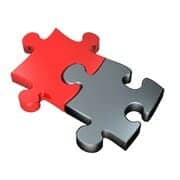
Make sure to use natural adjective + preposition combinations!
Order of adjectives
Did you know that there is a particular order of adjectives we should follow in a sentence? For example:
- Incorrect: a black little dress
- Correct: a little black dress
- Incorrect: a German old man
- Correct: an old German man
- Incorrect: a gold big beautiful ring
- Correct: a big beautiful gold ring
If you say the adjectives in the wrong order, it doesn’t sound natural.
In general, they follow this order:
- Opinion (interesting, beautiful, funny)
- Size (small, medium, large)
- Shape (round, flat, square)
- Age (old, young, new)
- Color (green, blue, yellow, black)
- Nationality/origin (Swedish, Korean, Israeli, Canadian)
- Material (wooden, metal, stone, paper)
- Purpose (tennis shoes, sleeping bag)
It may seem hard to remember the proper order… but the more you practice and listen to native English speakers, the more the natural order will sound “right” to you.
Click here for a list of adjective examples within each category, as well as a quiz on the proper order of adjectives
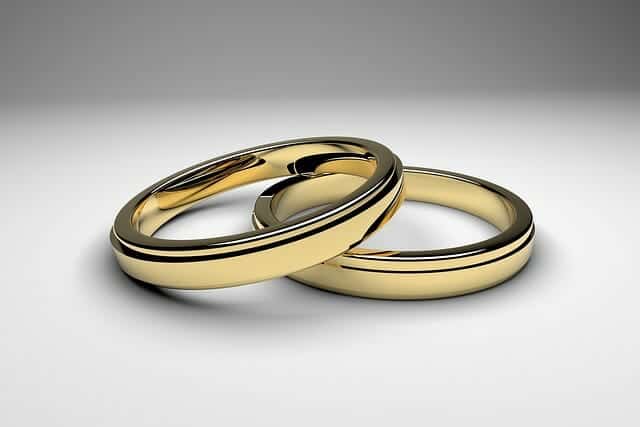
Order of adjectives: These are beautiful new golden wedding rings.
Common mistakes with adjectives
Avoid these common errors made by English language learners!
Putting the adjective directly after the noun. This may be possible in your native language, but not in English.
- Don’t say “I like the car red.”
- Say “I like the red car.”
Making an adjective before a noun plural:
- Don’t say “I have a few others things to do.”
- Say “I have a few other things to do.”
Adjectives before nouns are always singular, even if the noun is plural.
Using “enough” before an adjective:
- Don’t say “This box isn’t enough big.”
- Say “This box isn’t big enough.”
We use enough after adjectives, and before nouns (“We have enough chairs for the meeting”)
Using “how much” before adjectives:
- Don’t say: “I can’t believe how much expensive this restaurant is.”
- Say “I can’t believe how expensive this restaurant is.”
We use only “how” before adjectives.
However, when we use a comparative adjective, then we can use “how much”:
- “I can’t believe how much taller you’ve gotten!”
Saying “more better”:
- Don’t say “This program is more better than the old one.”
- Say “This program is better than the old one.”
- Or “This program is much better than the old one.”
The comparative form of “good” is simply “better.” We only use “more” with certain adjectives, often longer words – more exciting, more modern, more difficult.
However, we can say “much better” to emphasize that it is a LOT better.
Here are more examples of common mistakes with adjectives.
Learn more adjectives in English:
- 20 powerful adjectives in English
- Confusing adjectives and adverbs
- 10 negative adjectives in English
- 37 words for describing people

